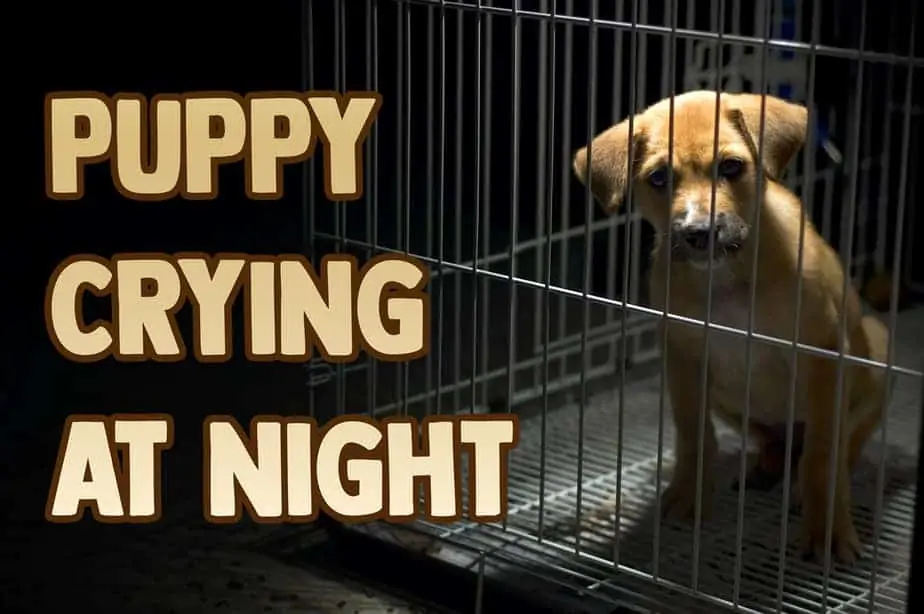It’s a special time getting a new puppy in your life, but they can also test your patience, especially when they’re crying in the middle of the night! We’ll take a look at the ins and outs of puppies crying at night, including what you should do, why your puppy is doing it, and how to ensure you and your puppy can get a good night sleep.
Should I leave my puppy to cry at night?
If your puppy is crying at night, you shouldn’t leave them to cry it out. While this advice was common (let your puppy cry in their kennel until they are quiet, and then let them out) it’s no longer recommended, as we’ve learned more about dogs and their emotions.
It’s important to understand that a puppy crying at night is only crying because they need something – comfort, a bathroom break, pain relief with a frozen teething toy, etc.
Puppies do not cry at night to manipulate you into letting them out of their crate or pen. They don’t have the ability to think through a plan to manipulate you – they are just babies wanting their needs to be met.
When you make the choice to bring a baby puppy into your home, you also become responsible for their wellbeing – both physically and emotionally.
You might wish to read our post Is it Cruel to Crate a Dog at Night? (Yes or No)
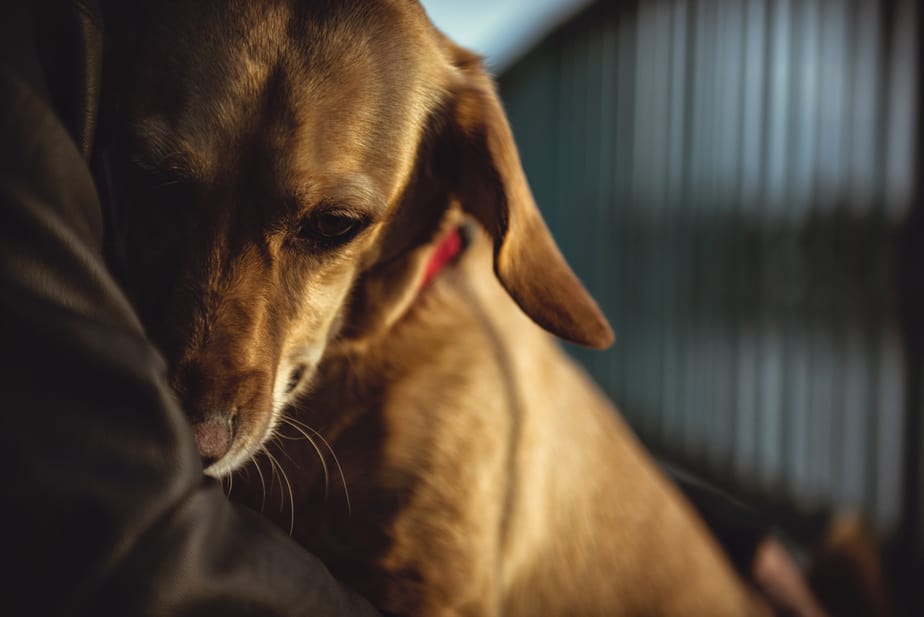
Leaving a puppy to cry
It’s now known that if you leave your puppy to cry at night, you are causing them a significant amount of stress. That stress can have a negative effect on their neurological development.
When animals, including dogs, are stressed, they release a hormone called cortisol. In excess, cortisol actually kills neurons, and thus the connections that are being made in your dog’s growing brain.
Stress early in life can also cause problems with digestion, immunity, and anxiety for the rest of the life of the dog.
We’re only recently getting a better understanding of how a dog’s mind works, and it’s not too dissimilar to our own. A few years ago now, Gregory Berns wrote a piece on the dog’s brain for the New York Times, in which he said, “The ability to experience positive emotions, like love and attachment, would mean that dogs have a level of sentience comparable to that of a human child. And this ability suggests a rethinking of how we treat dogs.” Here is the full article. And there’s a whole lot more information on it here.
When you leave your puppy to cry alone, you are also teaching them that you aren’t available to keep them safe, and puppies can often become even more anxious and fearful.
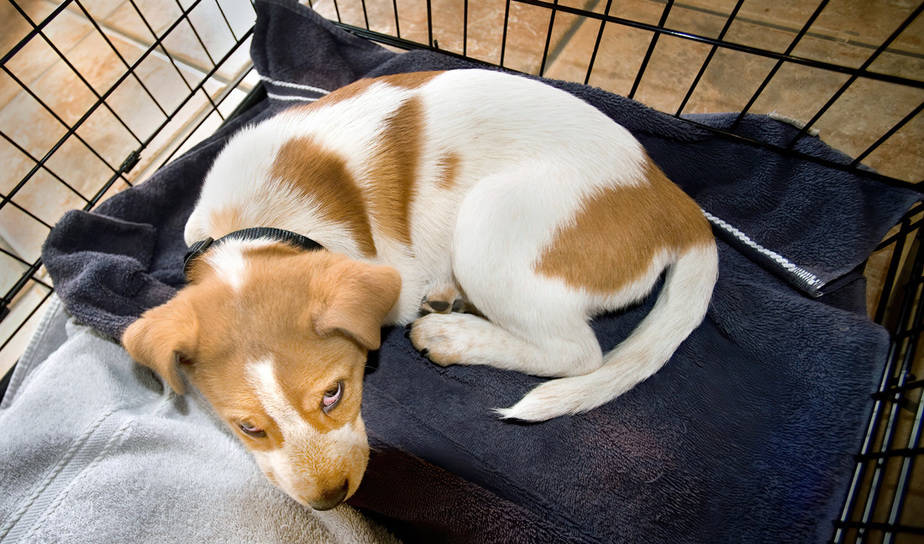
Fear and anxiety in a puppy is a major cause of behavioral issues, and you want to avoid this at all costs.
Supporting your puppy, including helping them when they cry at night, you will create a puppy that has the confidence to be more independent.
Giving your puppy this support will allow them the ability to explore more independently and confidently, because they trust that you are available as their backup.
In addition, if you help your puppy by soothing them when they become distressed, they will learn how to calm down and soothe themselves after a distressing event – whether or not you are present.
To sum up, not only will letting your puppy cry at night cause you to lose sleep, but it’s damaging for your puppy, too. There are other ways!
Instead, you should comfort your puppy, and find an alternative way for the two of you to get the relaxing sleep you need.
If you think your puppy is depressed then be sure to read our post: Puppy is Sad and Depressed: (What to do about it)
How long will a puppy cry at night?
How long a puppy cries at night depends on a puppy’s genetics and life experiences. Puppies that are confident will outgrow this crying stage faster than dogs with a timid temperament. Puppies that have crating and alone time experience with their breeder will also stop crying at night sooner.
It’s important that you start teaching your puppy how to be comfortable alone from the moment they come home – and preferably, that you pick a breeder or rescue foster home, that has helped to give your puppy these skills before they become a member of your own family.
Puppies that are simply left to cry it out may cry for a night or two, or they may cry for weeks. Their crying often returns, since the puppy never was taught good skills for how to be comfortable being alone.
It’s also important to note that how long your puppy cries on any given night can vary widely. Some puppies may cry for just a minute or two as they settle down, which is usually OK to allow.
However, for puppies that cry more than a minute or two, it’s important to intervene to prevent them from being negatively affected by stress.
It’s not unheard of for puppies that are left to “cry it out” to cry for hours on end, even through the night.
This is yet another reason why it’s important to intervene and give your puppy the skills they need, until they can self soothe and be comfortable alone at night.
Left without any intervention, neither you nor your puppy may get any sleep!
Before we go into more detail on night crying, if your puppy is crying during the day as well, it’s a good idea to read our article on Why Puppies Cry. Even when it comes to dealing with your puppy’s night cries, it’s important to understand the reasons behind it.
You might also like to read our post, Why Does My Dog Bark At Night? (Answered)

First night puppy crying
The first night a puppy comes home is often one of the hardest times of adjustment, both for the owner and the puppy. Up until this stage, the puppy likely hasn’t slept apart from their mom and littermates. The new environment, smells, and lack of mom and littermates means crying is to be expected.
It’s very normal for your puppy to be upset their first night away from home, so it’s important to prepare for ways you might soothe your puppy.
It’s also important to be flexible with your plans because your puppy may have different ideas of what is soothing than what you had planned.
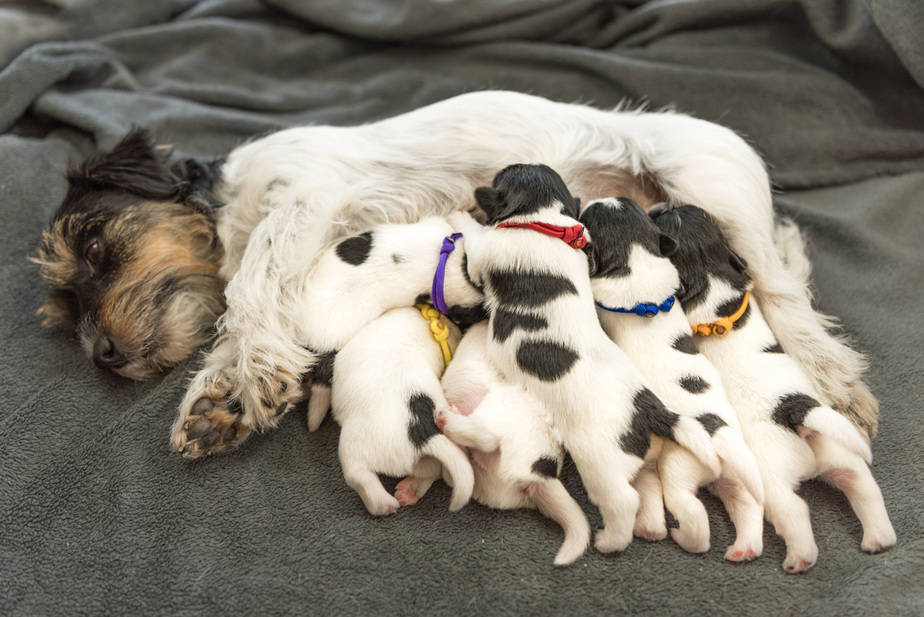
How I (a dog trainer) managed my puppies at night
My two most recent puppies came home to me at 10 weeks and 6 months, respectively.
My puppy that I brought home at 10 weeks, Windi, had been used to being crated while at his breeder’s home. It was still a transition period for him, but he settled into his covered crate next to my bed and only fussed for a few moments before sleeping through the night.
He was one of the easiest puppies to raise since his breeder had started crate training and potty training with him weeks before I brought him home.
I highly recommend looking for a breeder (or a foster home skilled in raising puppies) that gives your puppy these early skills to make the transition as smooth as possible.
My other puppy came to me at 6 months, being rehomed by his breeder after his first home didn’t work out.
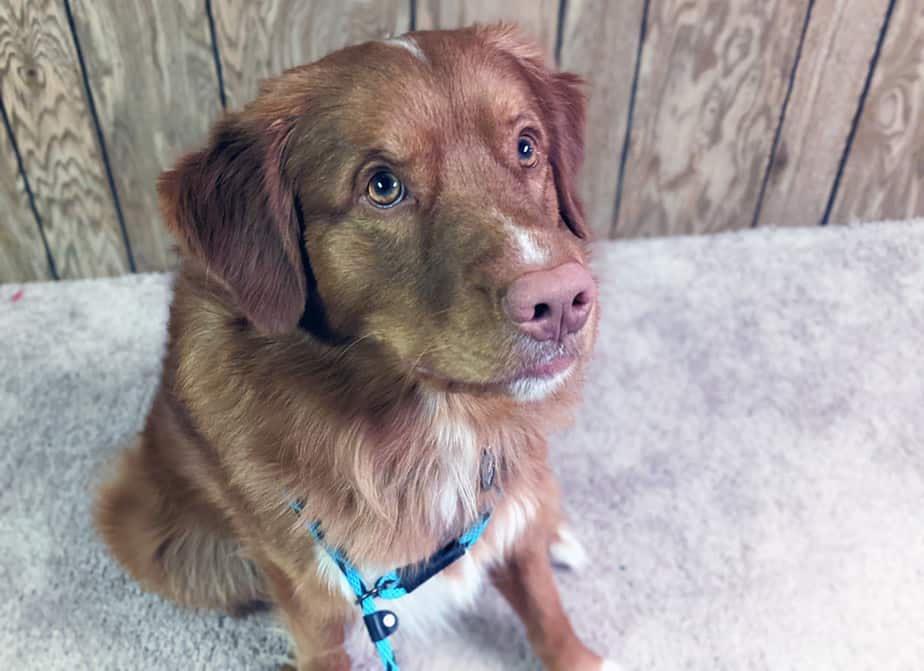
He’d had a lot more disruption in his life, moving halfway across the country and back, and then being with his breeder again before finally coming home to me.
While he’d been crated and been comfortable in a crate before, he was worried about all of the transitions happening in his life and was not comfortable being alone in the crate at night, even close to the bed where I was sleeping.
I also didn’t trust his potty-training skills yet since he was in a new environment, and 6-month-old puppies often get into things they shouldn’t, so I wasn’t ready to let him have free range of the room.
The puppy and I finally settled on a solution that worked for both of us – being baby gated in a hallway without anything that could be chewed, and not a lot of room to use the bathroom, while I slept on the floor. Yep, whatever it takes to ensure a smooth transition!
He spent that first night curled around my head and was content and comfortable, finally.
Next, we transitioned to being comfortable in an exercise pen – a short, circular fence that was set up in the living room. For a few nights, I slept on the couch next to this pen, while he slept contained within the pen.
When we transitioned back to sleeping in the bedroom, I tethered him to me via a leash so that his access to the room was still restricted.
As he grew up and I could trust him not to chew things he shouldn’t, he started to sleep loose within the bedroom, the same as the older dog.
Being flexible with what works for your puppy is important to their wellbeing and pays off in the end with a puppy that is comfortable being alone!
It’s also important to note that when I was raising my most recent puppy, you’ll notice that I didn’t use a crate.
Crates can be an incredibly useful tool for keeping your puppy safe when they are alone, as well as helping them learn good potty-training skills. However, if your puppy has an aversion to the crate, you can use other methods to teach them to be comfortable sleeping at night, too.
You need to do what works for you and your puppy’s situation to ensure you can solve the night crying.
Are you interested in reading our post, At What Age Do Puppies Stop Pooping at Night?
How to stop a puppy from crying at night
To stop your puppy from crying at night, you’ll want to determine why your puppy is crying. Once you know why your puppy is crying, you’ll be able to address whatever they need and help soothe them so they can stop crying.
Your puppy may be crying because they are scared and alone.
This is often the case when your puppy is new to your home and not used to being on their own.
Your puppy may be crying because they need to use the bathroom.
If your puppy has been comfortable and quiet alone for a while, and then starts crying, they may need to use the bathroom.
Puppies do not have the ability to fully control their bladder until they are 4-6 months old, and the younger your puppy, the shorter they can hold their bladder.
This chart can provide you with a general reference for how long you can expect your puppy to go without using the bathroom.
| Age of Puppy in Months | How Long Puppy Can Hold Their Bladder |
|---|---|
| 2 months | 3 hours |
| 3 months | 4 hours |
| 6 months | 7 hours |
| 12 months | 8+ hours |
The first step to stopping your puppy from crying at night is to try and prevent them from crying in the first place.
Follow the below headings to ensure you set your puppy up for a good night sleep, and hopefully one where they won’t be crying!
Ensure your puppy is tired before bedtime
Make sure you provide your puppy with a variety of physical and mental enrichment activities throughout the day.
When your puppy has their physical and mental needs met, they’re more likely to be tired and willing to sleep at the end of the day, and less chance of crying or whining.
Puppies do need a lot of sleep, up to 20+ hours a day, but they need the hours they are awake to be fulfilling!
Sarah Owings and Lili Chin have created this graphic on a dog’s emotional cup that can be helpful to reflect on when you are providing your dog with fulfilling activities.
One of the things that fills your dog’s emotional cup is the chance to do dog things, including:
- Sniffing
- Chewing
- Foraging
- Barking
- Digging
- Playing
Giving your dog an opportunity to engage in several of these activities each day will help your puppy have a fulfilling day where they are ready to sleep when the time comes.
If you’re concerned about taking your puppy into areas that have or have had unvaccinated dogs, then check out our post Puppy Vaccinations: When Can They Go Outside.
Some activities that relate to each of the bullet points that helps to fill your dog’s cup can be found in the chart below:
| Activity That Fills Your Dog’s Cup | Activity 1 | Activity 2 | Activity 3 |
|---|---|---|---|
| Sniffing | Take a meandering walk through a natural area with your puppy on a long leash, letting them sniff along the way. | Hide treats in your house for your puppy to sniff out. | Teach your puppy a fun game, like nose work, where they learn to sniff out a specific scent! |
| Chewing | Give your puppy a chew toy, such as a Benebone, cow’s ear, or whatever your dog prefers. | Freeze your dog’s meal in a rubber toy, such as a Kong, for them to chew on while they eat. | |
| Foraging | Feed your puppy from a snuffle mat. | Toss your pup’s kibble in the grass for them to forage and find. | Hide your puppy’s food in a variety of puzzle toys, and hide the toys around the house. |
| Barking | Let your dog express themselves occasionally! Not all barking is desirable, but sometimes when your pup is happy, it’s OK to let them bark! | ||
| Digging | Create a dig box for your puppy by filling a kiddie pool with sand, and then hiding toys and treats for them to uncover. | Fill a box with shredded paper or fabric to create an indoor version of a dig box, full of hidden toys and treats. | |
| Playing | Let your puppy have a playdate with a friend they love. | Play with your puppy, such as a chase game or hide and seek. | Grab a toy and play fetch, tug of war, or whatever game your dog desires! |
Pick a few of your puppy’s favorite activities each day to set them up for success when it’s time for bed, since they will be content and tired at the end of the day, which will mean less crying!
Create a cozy place
Puppies are used to sleeping in a pile with their siblings, so sleeping alone can feel like a big change.
You can help set your puppy up for success by giving them a cozy blanket or bed, so they have something to burrow into.
A hot water bottle or a similar warm object can also help your puppy feel warm and cozy.
There are also stuffed animals that contain the sound of a heartbeat, making your puppy feel like they are snuggled within a pile of their littermates.
Practice alone time
It’s important that you don’t only leave your puppy alone at night. While your puppy takes naps throughout the day, it’s the perfect time to let them practice being alone for a short period of time.
You will likely want to start by letting your puppy be alone within your sight, just not within your reach. A crate or exercise pen in the same area as you are, such as the living room or your home office, is the perfect way to let your puppy get used to the idea that they can’t reach you, but they aren’t completely alone.
As your puppy is comfortable, you can start to leave your puppy in a room by themselves for a few minutes at a time.
If at any point your puppy becomes upset, you’ve moved too fast, and it’s time to help soothe your puppy instead.
By increasing the time your puppy is alone and comfortable throughout the day, you’ll set your puppy up for success with being alone during the night, and stopping the crying before it even starts.
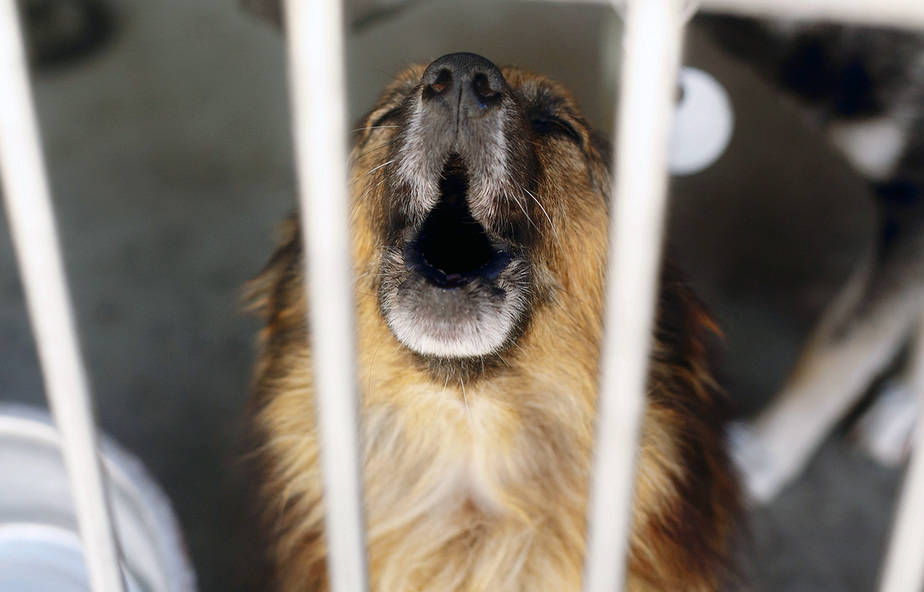
What to do when your puppy is actively crying
Soothe your puppy’s cries
Don’t leave your puppy to cry it out. Instead, soothe your puppy and help them feel more comfortable.
You may be able to soothe your puppy by moving their crate closer to your bed, offering them a Kong or another chew toy, or changing their sleeping arrangement for the night.
As you get to know your puppy, you’ll be able to address their needs sooner, so you can practice setting them up for success instead of soothing them after they are upset.
You can also take your puppy outside for a quick bathroom break just in case that’s the reason they’re crying.
Remember that your puppy is crying because they are upset and need something, and not to manipulate you.
It’s OK to soothe your upset puppy. In fact, it will reinforce to your puppy that you are there for them and will be a comfort, and when they’re not fearful or anxious, they will be less likely to cry.
You aren’t rewarding your puppy for crying. Soothe them in the moment and then plan for how you can prevent them from being upset in the future.
To summarize the methods of solving night-time crying:
-
Give them a few minutes to see if they calm themselves. If not, proceed to step 2.
-
Soothe your puppy if they are crying.
-
Ensure they don’t need to go to the toilet.
-
Give them a frozen toy to chew if they are teething.
-
Ensure their sleeping area is cozy, with soft toys, a hot water bottle, a heartbeat plush toy, etc.
-
Have your puppy close to you when you sleep.
-
If they don’t like the crate, it’s OK to let them sleep close to you outside of the crate. Read this post: Puppy Sleeping with You: What you need to know.
-
Ensure their daytime routine fills their emotional and physical needs, so they’re ready for a good night sleep.
Can a puppy cry itself to death?
No, a puppy will not cry itself to death. However, it’s not a good idea to leave your puppy alone and to let them cry. While your puppy won’t die from crying because they are alone, they may develop anxieties and behavior problems that can affect them for their life.
Puppies that have lifelong anxieties are more likely to be relinquished to the shelter, and more likely to be euthanized because of their behavior problems.
So, while your puppy will not die as a direct result of crying, they may indirectly develop behavior problems that cause them to be incompatible with your home and life in the future.
Separation anxiety and night crying
When a puppy cries at night, it doesn’t necessarily mean they are suffering from long-term separation anxiety. Puppies commonly cry when they first come home, since they are experiencing many changes and are away from their littermates and mother. It can take some time for them to adjust.
However, if you don’t address your puppy’s crying and let them cry it out, they may more easily develop separation anxiety in the future. We have a complete guide on separation anxiety here.
You can help to prevent your puppy from developing separation anxiety by teaching them to be comfortable being alone, rather than just letting them cry in their kennel or crate.
If your puppy is experiencing other symptoms of anxiety when alone, such as the list below, they may be suffering from separation anxiety rather than the normal adjustment to being alone.
Signs of separation anxiety
- Drooling
- Shaking
- Destructive activities
- Pacing
- Coprophagia (eating excrement)
- Urinating and defecating (Toilet training is having no effect)
- Repetitive behaviors
- Panting
- Excessive barking
- Restlessness
It’s estimated by the American Veterinary Medical Association that 17% of dogs in the USA suffer from separation anxiety.
It’s also the case that separation anxiety can occur because of both genetic and environmental factors. Even when you’ve set your dog up for success as much as possible, you can’t always overcome a genetic predisposition to separation anxiety if you don’t have the knowledge and skills for how to handle it.
In the case of true separation anxiety, your dog experiences constant stress as they are left alone and as their stress hormones stick around after the experience.
Your puppy is likely to cry or become upset not only when you put them in their crate, but when you start to prepare to put them in their crate or prepare to leave them alone.
In short, just because your puppy is crying while they are alone at night, it doesn’t mean they are suffering from separation anxiety.
However, it’s also possible that your puppy has a genetic predisposition to separation anxiety and is starting to experience this behavior concern at a young age.
Thankfully, there are trainers who are dedicated to solving separation anxiety in dogs. Malena DeMartini-Price is a skilled trainer who works with separation anxiety, and also has a variety of resources available for owner education.
In fact, she has published a book this year (2020) that provides an excellent resource training dogs that have separation anxiety. Her book, Separation Anxiety in Dogs, is available through Dogwise publishing. (I am not an affiliate for this book or the below course)
She also has a great, online, self-paced course (Mission Possible) for owners to work through their dog’s separation anxiety.
Finally, if you want the help of a professional, you can also use her database to search for a Certified Separation Anxiety Trainer to find a trainer that can help you and your dog directly.
If you don’t see a trainer local to you, don’t worry! Most of her trainers offer virtual lessons and they are extremely effective in solving separation anxiety with you through their video instruction.
Separation anxiety can have a large impact on your life and the life of your puppy, so if you are seeing the extra signs of stress that can come with separation anxiety, you should seek additional help as soon as possible.
Puppy crying getting worse
If you’ve been trying to help your puppy be more comfortable at night, but the crying has been getting worse, it’s likely time to seek out a professional dog trainer for help specific to your puppy and your situation.
Some puppies have a harder time adjusting to being alone at night and need more assistance than other puppies in order to be comfortable.
If you’ve tried the above list of 7 points and have had no luck with stopping your puppy crying at night, then getting some help from a professional is the way to go. You need your sleep after all!
Because dog training is an unregulated industry and requires no formal education, you can’t always trust that your local dog trainer is the best option for you and your puppy.
However, there are a variety of voluntary certifications, education opportunities, and memberships that many trainers who value the professional field of dog training will engage in and be a part of.
Some of these places where you can start your search for a qualified and professional dog trainer include:
- The International Association of Animal Behavior Consultants
- Karen Pryor Academy graduates
- Pet Professional Guild members
- The Academy for Dog Trainers graduates
- The Certification Council for Professional Dog Trainers
There are plenty of dog trainers that offer virtual coaching to help you develop a plan for training your puppy, too, if you don’t have a qualified trainer local to you.
The quicker you can help your puppy feel comfortable being alone, the less likely your puppy will have long-lasting effects from their discomfort.

